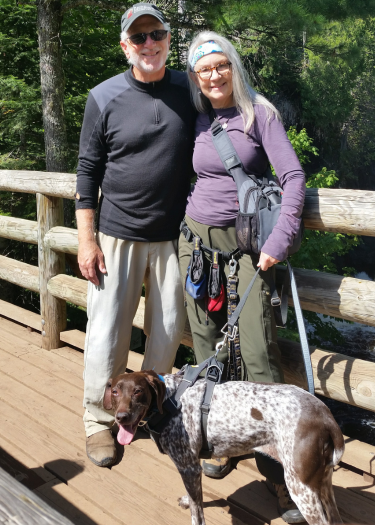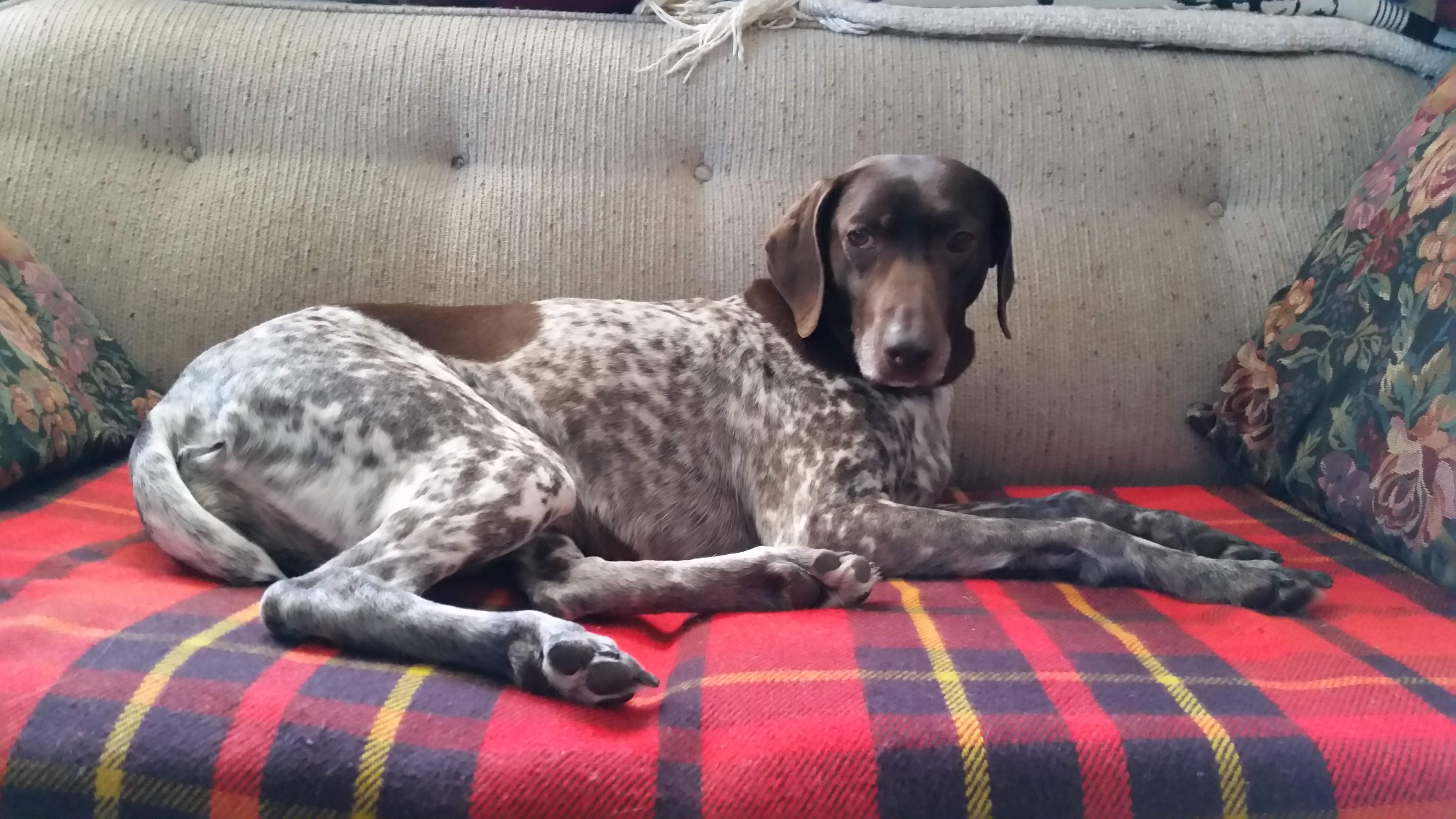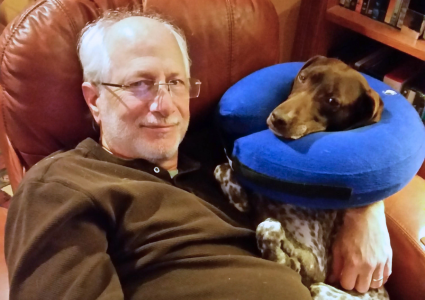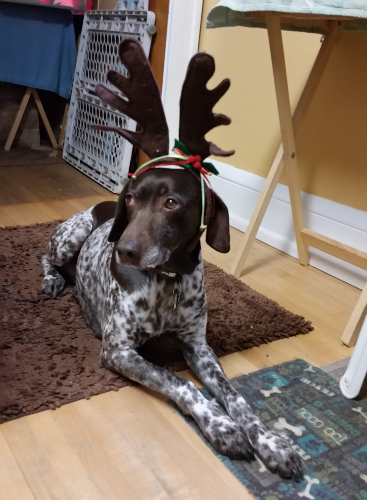Twin souls
Within three years, vets diagnosed Luna the German pointer with two types of cancer and a heart condition. She pushed through it all to comfort her owner during his own cancer fight.

Within three years, vets diagnosed Luna the German pointer with two types of cancer and a heart condition. She pushed through it all to comfort her owner during his own cancer fight.
Luna (left) and Aaron Milgrom snuggle during a visit to a local coffee shop.
The chapters of Luna’s life were often filled with happy moments. The snuggly German pointer loved sniffing around her backyard, walking in the woods, and spending time with her family—especially her dad, Aaron Milgrom.
Before finding her forever home, Luna’s first chapter was filled with mystery. Taken in by Great Plains Pointer Rescue in 2017, the staff knew little about the background Luna came from, but where she was going became their focus. Milgrom and his wife, Dawn Baker, met Luna at her then-foster home later that December, and the connection was instant—she jumped into their car with no hesitation.

“Luna always loved riding in the car and didn't have separation anxiety in the car like she had at home,” Baker says. “Luna always had anxiety, but when she finally was given a stable home, she became more confident.”
The Lewis Small Animal Hospital at the University of Minnesota Veterinary Medical Center (VMC) became part of Luna’s story a few months after her adoption when it was discovered a spay procedure performed on her prior to arriving at the rescue turned out to be incomplete. VMC clinicians fixed the mistake, and Luna made a full recovery.
Life went on for Luna’s family, each new chapter bringing highs and lows. Milgrom was diagnosed with pancreatic cancer in May 2021, and his family rallied around him—including Luna who was always by his side. After completing his first round of chemotherapy, the family was preparing to take a trip to his favorite place on the North Shore. Then, Baker noticed a lump in Luna’s mouth.
Baker rushed Luna to Urgent Care at the VMC, where clinicians were able to remove the lump and let the family continue with their trip.
“I was so grateful,” Baker recalls. “It was a beautiful, important trip, and Luna, being the pointer she was, didn't seem to notice that something had been cut out of her gum.”
A biopsy performed on the lump revealed it to be a form of oral melanoma, a type of cancer originating in pigment-producing cells.
“Malignant melanoma is the most common cancerous tumor of the mouth in dogs,” says Dr. Alana Kuzimik, a former Oncology Service resident at the VMC who treated Luna. “Melanomas can be very invasive and destructive within the mouth and also are highly likely to spread to places like lymph nodes and lungs.”
Luna’s care team at the VMC recommended a partial mandibulectomy, which would involve surgically removing part of her lower jaw to ensure as much of the cancer could be excised as possible. In September 2021, Luna underwent surgery and the procedure was deemed a success.
“Luna did well with the surgery and, even though her jaw was a little crooked for the rest of her life, she had a good quality of life, could eat normally, and her cancer never came back in that area,” Baker says.

Unfortunately, melanoma would not be Luna’s last encounter with cancer. A follow-up oncology CT scan in March 2022 revealed a thyroid carcinoma on the base of her tongue, but fate was on Luna’s side.
“Even for an aggressive cancer like oral melanoma, good outcomes are possible when they are caught early and treated appropriately. We only ever found Luna's thyroid tumor on a CT scan while monitoring for regrowth or spread for the melanoma,” Kuzmik says. “Because of this, Luna was able to have surgery to remove it while it was still small.
“Fortunately neither the melanoma nor the thyroid tumor ever grew back or spread. Luna is an example of how early and aggressive intervention, along with regular monitoring, can result in a good long-term outcome.”

As Luna faced her health issues, Milgrom’s battle with pancreatic cancer continued throughout 2022 and into 2023. Having first met in college while on a USO tour as student performers, he and Baker celebrated their 35th wedding anniversary in a hospital room. In time, Milgrom moved into home hospice care where Luna kept a watchful eye on him.
“Luna was always attached to Aaron more than any other family member and made sure he got out for walks throughout his cancer treatment,” Baker says. “When he could no longer go for walks, Luna stayed with him as much as possible and made sure he had her to snuggle with, pet her soft ears, and lay in bed with him.”
While Luna no longer had to fight cancer, she would have to contend with one more medical hurdle. During a visit for an infected paw, her regular veterinarian noticed Luna’s heart was beating irregularly and recommended Baker schedule an appointment with the Cardiology Service at the VMC.

Three days before that appointment in September 2023, Luna collapsed and Baker rushed her to the VMC’s Emergency and Critical Care Service. She was examined and diagnosed with an atrioventricular block, according to former VMC cardiology resident Dr. Emily Gavic.
“When Luna first came in, she could barely go longer than a few minutes without collapsing unconscious and was in a very critical state,” Gavic says. “Every time she got excited or energetic, her heart rate would spike and her heart block would kick-in, causing her to collapse.”
An atrioventricular block means the electrical signals necessary to stimulate Luna’s heart to pump blood between its upper and lower chambers—the atria and ventricles respectively—were not passing through the AV node, Gavic says. This node is a specialized region of the heart that purposefully delays the transmission of the signal so that the ventricles have time to fill with blood before being stimulated to contract.
This lack of coordination results in inefficient pumping of the heart and can lead to lethargy, collapse, or congestive heart failure. After Luna was examined, Baker learned she had two choices: euthanize Luna or let cardiologists implant a pacemaker to regulate her heartbeat.
“There was already so much looming potential death in our family—I couldn't let Luna go and wanted her to have a chance to live and spend more time with her dad,” Baker says.
Opting for the pacemaker, the device was implanted in Luna’s heart through a minimally invasive procedure. With her heartbeat back to normal, Luna could return to providing comfort to Milgrom as his cancer fight neared its end.
When that time came and he stopped eating, so did Luna. Days later—two-and-a-half years after his diagnosis—Milgrom passed away at home in late November 2023. Dedicated to following him wherever he went, Luna died the next morning surrounded by family at Lake Harriet Veterinary.

As painful as it was to lose her two cherished companions at the same time, Baker sees it as a fitting end to her faithful dog’s story.
“I know my answer to this question but when Luna passed, was it her physical heart that failed or did she decide to cross the Rainbow Bridge to go with Aaron to heaven?” she says. “I have no doubt that she knew her mission and went with him.”
Reflecting on Luna’s medical challenges and triumphs, Baker says she is forever grateful for the support she received from everyone at the VMC involved in her dog’s care.
“The doctors and all of the staff at VMC sustained me, Luna, and my family during every chapter of Luna's remarkable life journey,” Baker says. “I knew that whatever happened, I could be confident that she would receive exceptional, compassionate, and personal care.”